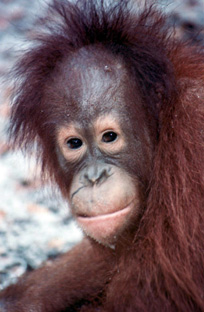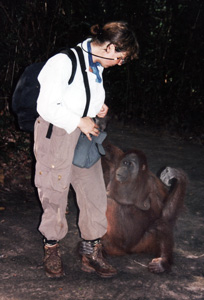Haben Sie Lust auf eine Kostprobe?
Dann lesen Sie diese kurze Erzählung aus Borneo:
Apes in the Rain
I was lying in my hammock under a mosquito net and could not sleep. It was about three a.m. and I knew I would have to get up at four. But I was too excited to sleep. All my life I had dreamed of doing research with wild animals in a wild place – and now, it was actually happening. I couldn’t wait! So, I was lying wide-awake and listened to the noise of the pitch-dark rainforest. Noise, mainly caused by the rain.
But this was Camp Leakey in Borneo, I was here with an international group of volunteers to assist with the research of orang-utans, and I was ready to do anything, even set out at 4.30 in a tropical downpour.

junger Orang Utan, Foto: Armstrong
Which we did. All four of us – two Dayak assistants and two volunteers – wrapped in rain ponchos and wearing head torches which threw thin beams of light through the dark sheets of rain. We were an eerie sight. Our task was to observe an orang-utan female with a baby and an elder daughter. But first, we had to get to their sleeping nests that meant one and half hours walking through the dark and wet swamp forest. Walking in the dark was not too bad. Difficult was only crossing the swamp on wet and slippery logs. When we reached the orang-utans’ sleeping nests it was still very dark and still raining. So, we sat down on a log and waited.

mit Orang Utan in Borneo
Usually, orang-utans get up at sunrise, which is around six. Not so this morning. Neither did it get much lighter at six, nor did the orang-utans make an appearance. They slept in – the only thing any reasonable being would do in weather like this.
Nevertheless, the other volunteer, Marjorie from Australia, and I had to start with our work. One of us looked up to the nests with binoculars and recorded what she saw, and the other wrote this down on a special research sheet. And that had to be done every minute from six to eight, and again from twelve to two. We swapped every thirty minutes, as your neck starts to hurt quickly when you keep looking up with your field-glasses at the nests, 30 metres up in the trees.
Our first hour was very easy: We saw nothing. But then, just after seven, I saw movement and then a red arm dangling out of the bigger of the two nests. The mother slowly got up. With her baby clinging to her belly she moved away, the juvenile followed her. And so did we. But it is so much easier to move in the forest when you are an orang-utan. Trying to keep up on the ground, stumbling around trees and though swamps, while observing what the apes did and writing that down at the same time, is much more difficult.
After a while the female had found a tree with ripe fruits and settled for a good long breakfast. As it was after eight we had a chance for a break. Marjorie and I strung our hammocks between two trees and enjoyed a rest. Well covered by our ponchos as it was still pouring with rain. The two Dayaks, used to the jungle and its weather, kept watch on the apes. Because losing them would have been a disaster, or so we had been told in the camp.
And we did not lose them. We followed them all day long. And observed how the juvenile again and again tried to get hold of the baby and, when being told off by her mother, had angry fits throwing fruit and twigs. And we watched with excitement three babies play together when their mothers had gathered in the same fruit tree. It was a perfect day. Even the rain had stopped around lunchtime.
Around six p.m. orang-utans build new sleeping nests. But sometimes they get up and build a new nest. Meaning we had to wait until our three orang-utans were well and truly asleep. We had to be sure which nests they were in, so that the next team would find them on the following morning.
Again it was dark when we stumbled home. At least, it was not raining, and we could hear the noises of the night: the chainsaw like screeching of the crickets, strange barks from Muntjak deer, and the wonderful evening song of a couple of gibbons.
We were tired when we got back to the camp around nine. Our boots and trousers were covered with stinking mud from the swamp; our shirts were wet from sweat. Fieldwork is very hard, we agreed, but fantastic. We were deeply happy. And didn’t even mind that there was no food left for us. Well, not much, anyway.
Ursula Armstrong
|




